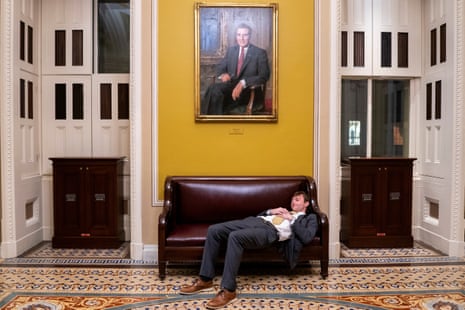The Senate “vote-a-rama” on the tax and spending bill, already a record for passing 45 consecutive votes, has now passed the 24-hour mark.
CNN is reporting that a final vote for passage could yet take place this morning, citing Wyoming Republican senator John Barrasso. The network says Lisa Murkowski of Alaska (see previous post) is indicating that a deal “is in the copy machine”.
Donald Trump, meanwhile, has indicated he is happy for the original 4 July deadlineto pass slip a bit.
The intrigue continues, and we are here to bring you all of it.
Key events Show key events only Please turn on JavaScript to use this feature
“Don’t run in a straight line. Look, like this!” Donald Trump makes a zigzag gesture to journalists at the White House as a demonstration of how immigration detainees should run away from alligators, if they escape Florida’s harsh new “Alligator Alcatraz” camp.
The president was speaking before departing for the Florida Everglades, where he will join Florida’s Republican governor Ron DeSantis to tour the facility, which is opening Tuesday.

The Federal Reserve chair Jerome Powell is due to speak at a European Central Bank event in Portugal, a day after Trump upped the pressure on him to lower interest rates.
In a Truth Social post on Monday, Trump demanded the US should have rates of 1% or less, adding that Powell and members of the Fed board of governors had failed to do their jobs.
Trump wrote:
If they were doing their job properly, our country would be saving trillions of dollars in interest cost. We should be paying 1% Interest, or better!
Donald Trump said migrants would need to know “how to run away from an alligator” to flee the new detention center he’s visiting in a remote area of the Florida Everglades.
Trump is on his way there for a walk of the facility, which the White House suggested would be especially secure given its dangerous natural surroundings. The detention center has been assembled on an isolated airstrip.
It has drawn protests over the potential impact on a delicate ecosystem and for a potentially cruel message the Republican president is trying to send to immigrants. A key selling point for the White House is the site’s remoteness.
Republican leaders huddling with Alaska senator Lisa Murkowski, seen as a holdout to the big, beautiful bill, as proceedings in the chamber slow almost to a halt, the Washington Post is reporting.
If three Republicans vote against the bill, it will fail, and Murkowski’s support is seen as crucial. She voted to advance it to the full Senate at the weekend, but has not committed to vote for it there.
Donald Trump called out Murkowski during his huddle with the media on the White House lawn a little earlier in what was clearly an effort to pressure her:
Alaska’s done so well with me. There’s never been a president who’s been better to Alaska than me. But it doesn’t mean people appreciate it.
Today is opening day for Florida’s so-called Alligator Alcatraz, a harsh, state-run immigration detention in the heart of the mosquito-infested Everglades. Naturally, Donald Trump is on his way there to take a look around and give his nod of approval.
The camp, which is slated to host an initial 500-1,000 undocumented immigrants flown in from around the country after they have been arrested by Immigration and Customs Enforcement (Ice), is the brainchild of Florida’s hard right attorney general James Uthmeier, a close ally of Republican governor Ron DeSantis, and a Trump sycophant in the eyes of critics.
The site is a remote, largely disused airfield, and crews have been working for days to set up tents where the detainees will be housed, patrolled by the Florida National Guard. Eventually, the capacity could reach 5,000.
Uthmeier, and also Trump at his White House gaggle with reporters just now, seem to be thriving on what opponents say is the cruelty of keeping hundreds of people outdoors during the heat and humidity of the Florida summer, where the heat index regularly tops 100F.
Trump, waving his arms in a zig-zag motion, had advice for those who tried to escape the camp, which is surrounded by alligators and pythons:
The states are fast, but alligators [are faster]. We’re going to teach them how to run away from an alligator if they escape prison. Don’t run in a straight line, look, like this, and you know what? Your chances go up about 1%. Not a good thing.
Trump will tour the facility later this morning with homeland security secretary Kristi Noem, DeSantis and other state officials. They will be greeted by protests at the gate.
An alliance of environmental groups, immigration advocates, and the Miccosukee and Seminole Tribes of Indians, oppose the camp, and a lawsuit was filed Friday to halt it arguing that a required environmental study hadn’t taken place.
Read more:
Trump says 'Doge is the monster that might have to go back and eat Elon'
Donald Trump has just been speaking with reporters on the White House lawn as he departs for Florida, and a trip to tour the new immigration detention facility known as Alligator Alcatraz (more on that shortly).
The president had a lot to say, not least a broadside at his on-again, off-again buddy Elon Musk, who has been critical of Trump’s big, beautiful bill, and has threatened to launch a new political party, as well as launching primary challenges to Republican senators, if the Senate passes it.
Trump indicated that Musk, head of the electric car company Tesla, was upset at losing the electric vehicle mandate (a tax subsidy for those who buy one) but “could lose a lot more than that”.
“We might have to put Doge on Elon,” Trump said, referring the the government of department efficiency that Musk headed before their fallout, and which has eliminated billions of dollars in government spending.
Musk, through Tesla, and especially from government contracts to SpaceX, has been the recipient of billions himself.
Trump said:
You know what Doge is? Doge is the monster that might have to go back and eat Elon. Wouldn’t that be terrible? He gets a lot of subsidies.
Trump also said he thought the Senate’s wrangling over the bill was going well;
I don’t want to go too crazy with cuts. I don’t like cuts. There are certain things that have been cut, which is good. I think we’re doing well. We’re going to see, it’s very complicated stuff.
[There’s] great enthusiasm, as you know. And I think in the end, we’re going to have it.
What is already the longest voting session in Senate history looks likely to go a while yet, at least according to Scott Bessent, the treasury secretary, who has just been on Fox & Friends in a confident mood:
I think we’ll get it this afternoon.
According to the Washington Post, Bessent blames Democrats for holding up progress of the so-called big, beautiful bill, although much of the delay appears to be in Republican ranks as they try to secure the numbers needed for it to pass.
It’s Richard Luscombe in the US taking over from my colleague Tom Ambrose to guide you through the day.
'Vote-a-rama' sets new record for longest in Senate history after 45 consecutive votes
As the Republican’s tax and spending cuts bill debate continues in the Senate, it is clear the marathon voting session is taking its toll on some staffers.
Here are some pictures…


The voting session has now reached 45 consecutive votes, setting a new record for the longest ‘vote-a-rama’ in Senate history.
The previous record of 44 votes was set in March 2008.
Eric Holthaus
A brutal stretch of severe weather has taxed communities on the eastern fringes of tornado alley this spring and early summer, while harsh staffing cuts and budget restrictions have forced federal meteorologists to attempt to forecast the carnage with less data.
As of 30 June, there have already been more than 1,200 tornadoes nationwide.
More than 60 people have died due to this year’s tornadoes, most of which have centered on the Mississippi River valley – about 500 miles east of the traditional heart of “tornado alley” of Kansas, Oklahoma and Texas. That unusual eastward shift may also be making tornado outbreaks more dangerous, bringing them in closer proximity to more people than the relatively sparsely populated plains states.
In addition to the tornadoes, it’s also been a burdensome year for flash flooding.
On 14 June, more than three inches of rain fell in just half an hour in West Virginia, washing away a young boy and prompting frantic emergency rescues across two counties in the northern part of the state. According to National Weather Service statistics, rainfall that intense could only be expected to happen about once every thousand years in a stable climate.
As the weather has worsened, there have been fewer federal scientists to alert the public of it.
Stanford University will cut $140m from its budget, citing ‘federal policy changes’
Cecilia Nowell
Stanford University will cut $140m from its budget in the coming academic year, citing “consequences from federal policy changes” including “reductions in federal research support and an increase in the endowment tax”. The news came in a letter Jon Levin, the university president, and Jenny Martinez, the provost, sent to faculty and staff last week.
The budget cuts will likely necessitate staff layoffs, deepening the impact of a staff hiring freeze the university announced in February. The university will continue hiring faculty, “although the pace may be somewhat slowed”, Levin and Martinez wrote. The cuts exclude the School of Medicine, which will make its own budget reductions.
“We believe deeply in the value of universities, in federal support for basic research, and in the endowment model that underpins financial aid and graduate fellowships. We will continue to advocate for these things,” Levin and Martinez said. “At the same time, we need to be realistic about the current landscape and its consequences.”
You can read the full story here:
The US national debt sits at $36tn, according to the treasury department. Trump’s budget bill will add an estimated $3.3tn to that debt, something so-called fiscal Conservatives are finding difficult to accept.
The bill contains a $5tn debt ceiling increase. The debt ceiling is a cap on the total amount the government can borrow.
As Reuters reports, the failure to pass some version would present lawmakers with a serious deadline later this summer, when the treasury department could come close to exhausting its borrowing authority and thus risk a devastating default.
The debt limit increase has caused Senator Rand Paul of Kentucky to come out in opposition to the bill.
Speaking to reporters on Monday, Paul, who represents Kentucky, said:
We have never raised the debt ceiling without actually meeting that target. So you can say it doesn’t directly add to the debt, but if you increase the ceiling $5 trillion, you’ll meet that.
And what it does is it puts it off the back-burner. And then we won’t discuss it for a year or two.

As we mentioned in the opening summary, Israeli prime minister Benjamin Netanyahu has said he’s going to Washington next week to meet with his close ally, US president Donald Trump, and other officials.
Speaking to a meeting of his cabinet, Netanyahu did not elaborate on the contents of his visit, except to say he will discuss a trade deal.
On Friday, Trump told reporters he believed a ceasefire in Gaza was close. Talks between Israel and Hamas have stalled over whether the war should end as part of any ceasefire.
Netanyahu, who is in the midst of a long-running corruption trial, has been accused of deliberately prolonging negotiations – and blocking their progress – to ensure his own political survival by having the assault on Gaza continue.

Beginning early on Monday and so far having run for roughly 19 hours, it remains unclear how long the voting in the marathon ‘vote-a-rama’ will last.
Republicans can afford to lose no more than three votes in either chamber to pass a bill the Democrats are united in opposition to.
If approved in the Republican-controlled Senate, Trump’s One Big Beautiful Bill Act will return to the lower House of Representatives, also Republican controlled, which passed its own version by a single vote at the end of May (215 to 214).
In the House, a full vote on the Senate’s final version of the bill could then come as early as Wednesday morning.

 2 months ago
106
2 months ago
106

















































